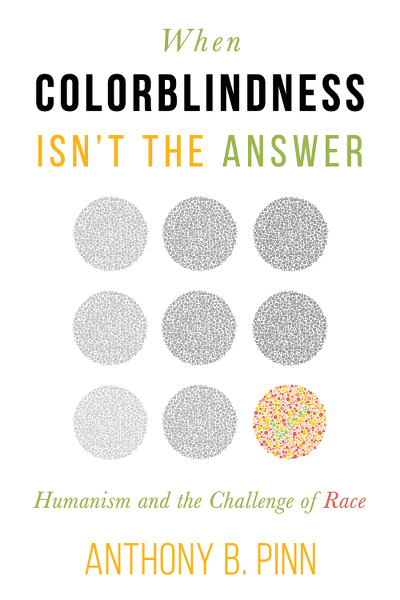Is there a connection between Humanism and race? There are no doubt atheists who believe the question of God marks the end of what we all have in common, but Dr. Anthony Pinn argues that the two subjects must go hand in hand. If we’re committed to making this life as good as it can be, we must be active in fighting for racial justice, especially when religion has been used to justify oppression and discrimination.
In his powerful new book When Colorblindness Isn’t the Answer: Humanism and the Challenge of Race (Pitchstone Publishing, 2017), Pinn makes the case for why Humanists have failed to “provide a more compelling alternative to theism” for various minority groups and how we can change that.

In the excerpt below, Pinn points out how some of the Founding Fathers atheists point to in admiration can’t be separated from their own racist behavior.
Celebration of humanists across the centuries often fails to acknowledge the underbelly of humanism, or the ways in which it is similar to theism: both have a long legacy of problematic stances toward race.
According to Susan Jacoby, only two freethinkers, or humanists, have received appropriate attention — Thomas Jefferson and James Madison. I am not in a position to advance nor deny that argument. And for the purposes of this text such an exploration isn’t necessary. Suffice it to say, they are important figures within the history of the United States and within humanist circles. And, the relationship between freethought and race presented by such figures is instructive. Both were men of great intellect and profound importance for the establishment of the United States as a secular nation, and both at least passively endorsed (e.g., inherited slave estates) the system of slavery.
What I offer here isn’t a history lesson on the philosophy of these two figures, but rather something about them and humanists’ appreciation for them speaks to challenges regarding race worthy of addressing. I’m not especially concerned with the details of their secular thinking, the degrees to which they were definable as humanists based on contemporary understandings of the terminology. The fact that humanists claim them and do so with significant energy, for my purposes, is sufficient. They, as some might put it, are case studies of a sort that point to some incorrect assumptions made by some humanists. Secular government was and remained intimately linked to the problem of race acted out as racism. What are contemporary humanists to say about this?
For instance, again take Thomas Jefferson and his undeniable importance with respect to the articulation of the principles, values, and ideals that shape democracy in the United States, as well as his significance regarding public, higher education vis-à-vis the University of Virginia. Jefferson was also a slaveholder, whose wealth and influence was dependent upon a system of brutality that held in inhumane bondage peoples of African descent — beings whose humanity was questioned and who were without will to determine their own life options. He framed the workings of democracy as the political system of the new United States, but he supported the system of slavery through his direct participation in it. I’ve not heard much made of this latter point. Yet, isn’t it important? Doesn’t it provide a warrant for humility, and for a more balanced presentation of humanism, warts and all?
Theists assume the plausibility of perfection and as a consequence demand its significant figures be without flaws or at least — like the biblical figure King David — have notable signs of God’s favor that blur out the messiness of life or at least point beyond it. Paradox and tension are difficult for theists, certainly when the paradox isn’t resolved or the tension eased. For theists, history is purpose driven; the universe is concerned with and about humanity. And, situations and topics that challenge the pleasantries of this assumption trouble theists. On the other hand, humanists, with a more mature sense of humanity, shouldn’t hold to the same demand for a stain-free existence. But yet, there appears to be at least a passive effort to remove the taint of racism from humanist legends such as Jefferson. Yes, Jefferson feared slavery would destroy the nation in that it was a plague with dire consequences. He believed ending slavery in Virginia and elsewhere also held the potential to flood the nation with a population it could not absorb and that couldn’t integrate in a significant manner because of its inherent and undeniable inferiority.
Here we have it in brief: a significant humanist figure with significance to the United States from its initial formation to the present is also a prime example of the status quo in the form of race-based oppression. In a word, Jefferson represents both humanism and racism. One might argue Jefferson and those like him were “men” of their age — trapped in the workings of their time period and shaped by the sociocultural codes of that historical moment. This is true and this is why I would never suggest we ignore, for instance, Jefferson’s contributions to our particular structuring of democracy and our resulting best practices of collective life. However, recognizing this doesn’t free humanists from also recognizing the manner in which he represents some of the most troubling practices of race-based violence witnessed in the modern period. The former is to be celebrated and the latter acknowledged with every effort to learn from bad policy and behavior, and not repeat it. Will such an admission — despite the fact that plenty of Christians bought and traded in slaves, disregarded American Indians, and abused Latinos/as — fuel hostility toward humanists and prove for the general U.S. population that humanism is immortal and flawed? Can humanists acknowledge participation in racism and maintain their critique of theistically fueled injustice?
It’s a delicate balance to be sure: a problem and solution wrapped in one and tied together nicely with a bow of energetic prophecy that screams accept these proclamations or experience eternal damnation… because God loves you to death. Within Christianity, the dominant tradition in the United States, this tension is in part a consequence of a really low opinion of humans and human nature. Based on a rather bizarre creation story, humans start out behind the curve, with a warped nature — the stories go — marked by a tendency toward immorality, disobedience, and questionable values. Left to their own devices, this demented story continues, humans will do no good. And so Christians spend so much time trying to correct for this original flaw, while also thinking of their condition as an opportunity for God to prove God’s goodness.
Those who are despised take every opportunity to demonstrate that actually they are beyond reproach — upstanding people, with integrity, values, and an important role to play in the life of the nation. A type of respectability guides this thinking: if we can prove ourselves acceptable — whatever that means at the time — we will gain the status and the position we merit. As I see it, some version of that thinking is in play in many humanist circles concerning a variety of topics. Still, to claim figures such as Thomas Jefferson and in this way lodge humanism in the workings of the United States is also to tie humanism to various modalities of racial injustice. What to do?
Humanists embrace this respectability position with issues such as racism; and, racial minorities such as African Americans have been forced to do it with respect to virtually every social ill. Any crime implicates all; any social slip implicates all, and so on. Will theists use this information (as well known as it is) against humanists? And, would such a strategy harm the effort of humanists to make the United States a more secular nation? And so there is in some quarters a tendency to hide the unpleasant dimensions of life lived by some humanists, to downplay any significance. This is an understandable approach, but it does raise a point worth consideration.
Still, to embrace Jefferson, then, is to acknowledge at least a subtle connection to both a legacy of profound humanist thought and a legacy of profound humanist racism. This does not mean humanism and humanists are inherently racist; but it does do damage to a too popular assumption that humanism doesn’t bend to the social construction of race in ways that would make it a significant part of the racism problem.
When Colorblindness Isn’t the Answer: Humanism and the Challenge of Race is available now online and in bookstores.




It’s Moving Day for the Friendly ..."
It’s Moving Day for the Friendly ..."
It’s Moving Day for the Friendly ..."
It’s Moving Day for the Friendly ..."